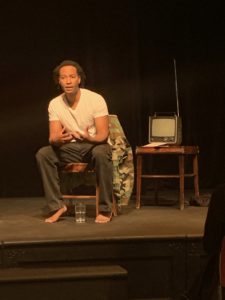TRENTON, N.J. – In conjunction with Black History Month, Passage Theatre featured two plays about characters who were revolutionaries within the context of their time periods in American history.

— Photo by Michelle Dryden
The Passage Theatre Company located in the historic Mill Hill Playhouse at 205 E. Front St. in Trenton, hosted the Solo Flights series of shows from Feb. 8 to 17.
The 2019 series of shows included their first play called, “To My Unborn Child: A Love Letter From Fred Hampton,” written and performed by Richard Bradford as Fred Hampton. John Doyle directed it.
The second revolutionary play in the series was titled “Bicycle Face,” which was written and performed by Hannah Van Sciver, and directed by David O’Connor.
Even though both shows were equally important to American History, the first play depicts the struggles of Black America more vividly.
“To My Unborn Child: A Love Letter From Fred Hampton,” a “powerful play about change, love, and legacy, sheds fresh light on a little understood period of our country’s history, and was originally produced by Iron Age Theatre,” states Elizabeth Zuckerman, administrative and marketing associate at Passage Theatre.
The audience, who attended the first night of the Fred Hampton play was in for a profound experience as they had the company of Bobby Seale, co-founder of the Black Panther Party, where Fred Hampton was also a member.
Even Bradford, who was acting as Fred Hampton in his solo performance, said he was overjoyed by Seale’s appearance.
“I almost cried when he reached up at me and shook my hands,” said Bradford.
Along with Huey P. Newtown, Seale co-founded the Black Panther Party in 1966, serving as chairman.
In 1968, on trial as one of the “Chicago Eight,” he was famously chained and gagged in the courtroom after requesting that his lawyer be present.
He has written several books including his autobiography A Lonely Rage, which provides invaluable windows into the history and ideology of the 20th Century American political protest.
Artistic Director at Passage Theatre, Ryanne Domingues, states that, “We are honored to have Mr. Seale speak to our community…”
She mentions that Seale was an activist who helped to shape the landscape of social activism and community outreach, and that his stories of the past are now part of our collective history.
Likewise, Fred Hampton was a visionary Black Panther, who was also a revolutionary fighting for social justice, but was murdered by Chicago police as he lay by his pregnant lover at age 21.
Thus, there was a letter written to his unborn child.
Hampton preached a humane, compassionate revolution against racist brutality, child hunger, poverty, and capitalism.
Bradford brought Hampton’s legacy to life on the stage as he performed a well-researched and timeless-written play.
The actor said he wrote the play about three years ago, and said that he even spoke with Hampton’s son, who still lives in Chicago.
Bradford also said he thinks that the Black Panther’s movement still exists in society today, but that it has evolved in art forms such as music.
While the Black Panthers fought for justice against racism and other social movements, women in America had been fighting for equality to men even before that time.

— Photo by Michelle Dryden
So, the second Solo Flights play this year, titled, “Bicycle Face” addresses that issue.
In the early 19th Century, there was a movement for women to become just as mobile as men, by riding bicycles.
Van Sciver played the part of three female characters who were trying to revolutionize their worlds, hoping society would get better for them.
She showed how they tried to find their place in their new societies even after one getting in trouble for riding a bicycle.
Women fighting for the power to ride bicycles, revolutionize their clothing where they could begin to wear pants, and also helped them to be more than just homemakers who previously had no way to get outside their homes.
Both plays recognize the humanity of their characters’ actions within the context of their time, states Dominguez.
“Whether speaking at a rally, or simply riding a bike, all of the characters in this year’s Solo Flights are revolutionaries,” she notes.

